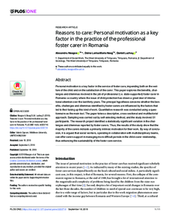Displaying 681 - 690 of 2221
Abstract
Indigenous cultures have been under significant attack in Canada since first contact with Europeans. This has resulted in significant harm to Indigenous Peoples and particularly to youth in state care, who often struggle with their identity when they are placed in non-Indigenous out-of-home settings. Developing protective ways of countering this is compounded by the lack of understanding of identity development amongst Indigenous youth. This article reviews theories of Indigenous identity development and their implications for Indigenous children, particularly those caught in the nexus of two cultures, as is the case with those in state care.
This country care review includes the care related Concluding Observations adopted by the Committee on the Rights of the Child and the Committee on the Rights of Persons with Disabilities as part of the Committees' examinations of the periodic reports of India.
For this study, the authors carried out a retrospective review of looked-after children and young people (LACYP) caseloads in North Somerset Local Authority between Jan and Dec 2018 to ensure national standards are being met and provide a benchmark for future quality improvements.
This paper explores the benefits, challenges and dilemmas involved in the job of professional (i.e. state-supported) foster carer in Romania–a country where the issue of child protection has drawn a great deal of international attention over the last thirty years.
This article explores child welfare professionals' understandings of well-being, as well as barriers and facilitators to well-being in their practice experience.
The aim of this module from the book Rights-based Integrated Child Protection Service Delivery Systems is to learn to place children in specific alternative childcare services.
This article presents the perspectives of three authors - who have collective experience in administration, practice, and research in both systems - on the interaction between the adult corrections system and the child welfare system in the USA and the implications of this interaction for children with incarcerated parents.
The objective of this study was to compare the outcomes for the Neuro-Physiological Psychotherapy (NPP) intervention group to those of a control group.
The aim of this study was to document the health needs of Aboriginal and Torres Strait Islander children and adolescents in OOHC attending the paediatric service at the Victorian Aboriginal Health Service (VAHS) between February 2014 and February 2016.
In this video, Children in Families ABLE project practitioners speak to their experience and learning around recruiting foster families to care for children with disabilities, including the types of families to target and how to use role-modeling to address issues of stigma in the community.


